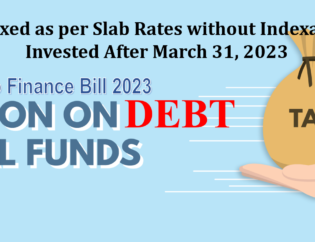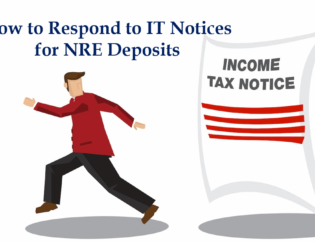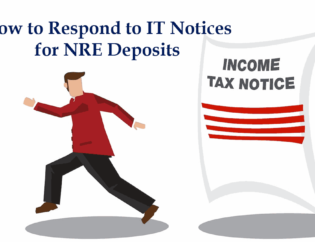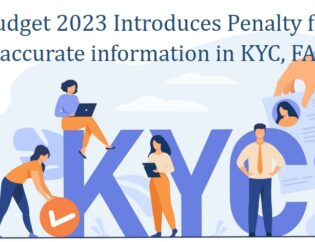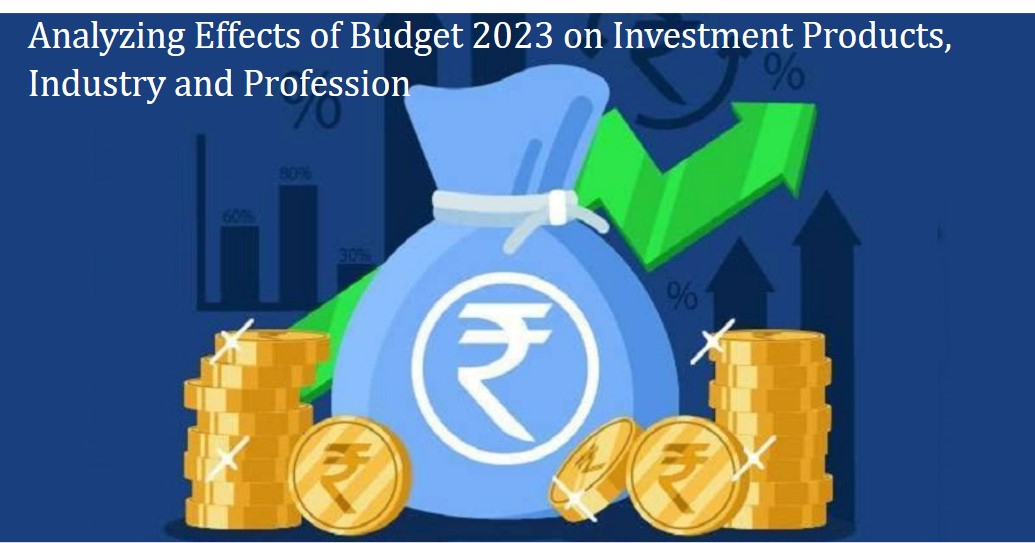
Budget 2023 is critically important for the Investment Industry and the Investment Advisory profession has entered mainstream as we believe it breaks many psychological barriers related to investments.
Now, retail investors would realize that investments should not only be for the tax planning but should be for family’s financial security and well being. HNIs should also realize that the income tax department knows when innovative products exploiting tax loop holes are introduced and are also quick to fix them.
The budget introduces many industry wide and investment product related critical changes, which are analyzed as follows:
A. Industry Wide Changes
- Review of Financial Sector Regulations
Financial sector regulators will carry out a comprehensive review of existing regulations considering suggestions from public and regulated entities and set time limits to decide the applications under various regulations. This will simplify processes, bring clarity, ease and reduce cost of compliance.
- Capacity Building in Securities Market
SEBI is empowered to develop, regulate, maintain and enforce norms and standards for education in the National Institute of Securities Markets (NISM) to build capacity of functionaries and professionals in the securities market. As a result, the quality of professionals in financial services would increase.
- Simplification of Know Your Customer (KYC) process and One stop solution for identity and address updating
The KYC process will be simplified adopting a ‘risk-based’ instead of ‘one size fits all’ approach. Also, one stop solution for reconciliation and updating of identity and address of individuals maintained by various government agencies, regulators and regulated entities will be established using DigiLocker service and Aadhaar as foundational identity. These measures will simplify onboarding of clients and make life easier for intermediaries.
- Reclaiming of shares and dividends
An integrated IT portal will be established for investors to reclaim unclaimed shares and unpaid dividends from the Investor Education and Protection Fund (IEPF) with ease. Investors would now have visibility about the old shares and dividend and it would be easier to claim the amount.
- Penalty for furnishing inaccurate details in KYC, FATCA/CRS declaration
Account holders and investors are made responsible for updating KYC as soon as there is any change in any particulars by introducing penalty for inaccurate information. Also, awareness about FEMA provisions especially residential status would become extremely important as KYC for investments needs to be done in compliance with FEMA. This is extremely important update. please check my blog for more details
B. Changes related to Investment Products:
- ELSS, Insurance and other tax savings instruments no longer relevant:
New tax regime, where no deductions are allowed, is given extra push and will now be the default tax regime. As a result, the tax saving investments especially the insurance, ULIP, ELSS, PPF would be affected. Retail investors were limited to think that because investment is done for tax planning, no more investment is required. Now, the tax payers have to think outside and be responsible for their own investments.
The critical impact I see now is the change in psychology of investors from treating investments solely as saving taxes to achieving goals and financial security.
- Insurance
Insurance premium over Rs. 5 lakhs per year would become taxable at a slab rate. As a result, no HNI would invest in these plans. The insurance industry will be hugely impacted and the growth in Insurance sector would be limited or even negative.
- International Investments
TCS on remittances of funds out of India is increased to 20%. As a result, the investments in foreign markets and international securities will be reduced drastically. Even HNIs would think twice before transferring money for investing in overseas markets.
- Real Estate
Exemption from long term capital gain for buying a residential property is now capped at 10 cr. As a result, big ticket Real Estate investments in residential property made for tax savings may reduce. Also, the interest on borrowed capital would not be included in the cost of purchase or improvement if the interest is claimed earlier as deduction. These provisions may not materially affect the Real Estate investments.
- Real Estate Investment Trust (REIT) / Infrastructure Investment Trusts (InvIT)
Any distribution that is not in nature of income like repayment of loan or redemption of units would become taxable as other source of income and taxed at slab rates after deducting the cost of purchase. As a result, REITs and InvITs may not be as tax efficient and investments in these instruments by HNIs will be reduced.
- Gold
Any conversion of physical gold to Electronic Gold and vice versa would not attract capital gain and would be tax free. It is a welcome step for investors to get used to owning gold in electronic form and in long term to reduce buying physical gold and move towards electronic gold or Sovereign Gold Bonds.
- Alternative Investment Fund (AIF)
SEBI proposed mandatory offering of direct plans in AIFs and introduced trail model for distribution commission to curb mis-selling. As a result, AIFs will lose the interest from distributors who used to get very high upfront commissions.
- Market Linked Debentures (MLDs)
The gain on sale of market linked depentures would be taxed as short term capital gain only. As a result, the tax on MLD is increased from 10% to slab rates making MLDs tax inefficient for HNIs and will be avoided by them.
- Senior Citizen Schemes
The limit of Senior Citizen Savings Scheme is increased from 15L to 30L and maximum deposits of Monthly Income Account Scheme is increased from 4.5L to 9L for single account and 9L to 15L for joint account. This will bring additional security of investments and return to senior citizens.
- Mahila Samman Savings Certificate (MSSC)
A one-time new small savings scheme is introduced for investments in the name of women or girls of upto Rs. 2L for 2 year at 7.5% up to March 2025.
- Online Gaming:
Applicability of TDS on income from online games is changed from Rs. 10,000 in every transaction to aggregate amount for the year and TDS is to be deducted at the end of year or at the time of withdrawal if total income is over Rs. 10,000, bringing many players in the tax net.
Conclusion
All these proposals proves government’s commitment to streamline investment process, increase professionalism in investment advisory, reduce the hype of sophisticated investments, separate investments from insurance, promote domestic savings and investments and make investors responsible for their decisions while reducing distribution costs and curbing mis-selling.
All of these indicate a great need for genuine Investment Advisors – the SEBI Registered Investment Advisors.



